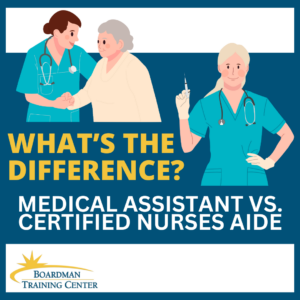Content Updated 01/11/2024
It’s no secret that there are many great reasons to pursue a career in healthcare. There are a wide variety of career paths, the industry is continuously growing, and you can make a real difference in the lives of your patients. 
With so many different paths available within the medical industry, it can be overwhelming and confusing to determine which career is best for you. Boardman Training Center is here to help you by breaking down the differences between two common entry-level healthcare positions: Medical Assistant and Certified Nurse Aide.
Career Outlook
Medical assistants have a promising career outlook. According to the Bureau of Labor Statistics data, medical assistant professionals have a projected growth rate of 14% from 2022-2032, which is considered much faster than average. While local needs may differ from national averages, beginning a career in medical assisting can open doors for those who want to advance their career into other aspects of the healthcare field. This means that more medical assisting positions will become available, and employers will be searching for qualified candidates to hire.
The BLS estimates that positions for certified nursing aides and similar positions will grow by 4% in the same time frame, considered the average across all occupations in the United States. This means that opportunities for a CNA position could be harder to come by than a medical assisting position.
Skills Required
Medical assistants perform various direct patient care tasks and administrative duties that keep a medical facility running smoothly. Some of their responsibilities can include assessing patients, helping doctors with treatment plans, taking vital signs, administering injections, preparing lab tests, charting, scheduling, and more. Students enrolled in the Boardman Training Center Medical Assisting program will complete hands-on labs to practice their skills during the course of their 12-week training, preparing them for success on the job.
Meanwhile, certified nurse aides focus more on helping with daily living activities and direct patient care. Common skills that CNAs perform on the job are bathing and cleaning patients, moving them between wheelchairs and beds, assisting patients while walking to and from the restroom, helping patients dress, and changing linens.
Training Needed
Specialized training is required to start a career as a medical assistant to gain the necessary skills and knowledge to perform the job safely and competently. Most Medical Assisting programs are completed in under two years, combining classroom instruction and hands-on training. Additionally, it can be helpful to choose a medical assisting program that prepares you for nationally recognized healthcare certifications, as many employers prefer candidates who are certified in their industry.
For example, the Boardman Training Center Medical Assisting program incorporates hands-on skill training and preparation for the National Healthcareer Association Certified Clinical Medical Assistant (CCMA)* and Certified Medical Administrative Assistant (CMAA)* exams.
Training is also necessary to become a certified nurse aide, and this training is typically completed on an hourly basis. In their training, CNAs will learn and practice direct patient care, documentation, and patient safety. Certified nurse aides must attend a class approved by the state of Ohio and pass a competency exam upon completion of the program. Additionally, a set number of clinical hours are required to become certified, which can vary by state. In Ohio, at least 16 hours of supervised resident care must be completed in a long-term care facility or nursing home to become certified.
Work Environment
The versatile skill set that medical assistants receive in their training allows them to work in various medical facilities, such as physicians’ offices, hospitals, outpatient care centers, laboratories, family medicine practices, and more. Working in a physician’s office is the most common, with 57% of all medical assistants surveyed by the BLS in 2022 being employed in this type of facility. Many of these professionals work full-time; however, their schedules may vary depending on their typical facility hours.
The most common employment locations for certified nurse aides are nursing homes and hospitals, each holding 33% of all CNAs employed in the United States, according to the BLS. Other places a CNA can work include assisted living facilities, home healthcare services, and government agencies. Because of the nature of their work, many CNAs must be on their feet and are frequently expected to lift over 50 pounds. This can make the job more strenuous and physically demanding. Many CNAs work full-time hours, but some work part-time as well.
Start Your Medical Assisting Career
Now that you know the differences between a medical assistant and a certified nurse’s aide, you are equipped with the knowledge to choose the career path that best meets your goals. If you think a career as a medical assistant is the right choice for you, then Boardman Training Center’s accelerated 12-week Medical Assisting program could be perfect for you!
Get started today by contacting our admissions team by calling 330-729-9244 or Requesting Information.
*Certification is contingent upon passing the corresponding industry certification exam.
